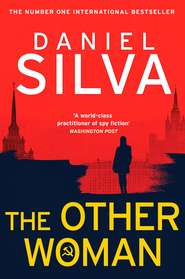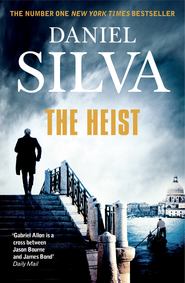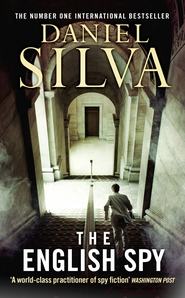По всем вопросам обращайтесь на: info@litportal.ru
(©) 2003-2024.
✖
The English Girl
Автор
Год написания книги
2018
Настройки чтения
Размер шрифта
Высота строк
Поля
“To be honest, Graham, I didn’t have time to enjoy the moment. I was too busy trying to keep Eli alive.”
“How is he?”
“He spent two months in the hospital, but he looks almost as good as new. He’s actually back at work.”
“For the Office?”
Gabriel shook his head. “He’s digging in the Western Wall Tunnel again. I can arrange a private tour if you like. In fact, if you’re interested, I can show you the secret passage that leads directly into the Temple Mount.”
“I’m not sure my government would approve.” Seymour lapsed into silence while a waiter refilled their coffee cups. Then, when they were alone again, he said, “So the rumor is true after all.”
“Which rumor is that?”
“The one about the prodigal son finally returning home. It’s funny,” he added, smiling sadly, “but I always assumed you’d spend the rest of your life walking the cliffs of Cornwall.”
“It’s beautiful there, Graham. But England is your home, not mine.”
“Sometimes even I don’t feel at home there any longer,” Seymour said. “Helen and I recently purchased a villa in Portugal. Soon I’ll be an exile, like you used to be.”
“How soon?” asked Gabriel.
“Nothing’s imminent,” Seymour answered. “But eventually all good things must end.”
“You’ve had a great career, Graham.”
“Have I? It’s difficult to measure success in the security business, isn’t it? We’re judged on things that don’t happen—the secrets that aren’t stolen, the buildings that don’t explode. It can be a profoundly unsatisfying way of earning a living.”
“What are you going to do in Portugal?”
“Helen will attempt to poison me with her exotic cooking, and I will paint dreadful watercolor landscapes.”
“I never knew you painted.”
“For good reason.” Seymour frowned at the view as though it was far beyond the reach of his brush and palette. “My father would be spinning in his grave if he knew I was here.”
“So why are you here?”
“I was wondering whether you might be willing to find something for a friend of mine.”
“Does the friend have a name?”
Seymour made no reply. Instead, he opened his attaché case and withdrew an eight-by-ten photograph, which he handed to Gabriel. It showed an attractive young woman staring directly into the camera, holding a three-day-old copy of the International Herald Tribune.
“Madeline Hart?” asked Gabriel.
Seymour nodded. Then he handed Gabriel a sheet of A4 paper. On it was a single sentence composed in a plain sans serif typeface:
You have seven days, or the girl dies.
“Shit,” said Gabriel softly.
“I’m afraid it gets better.”
Coincidentally, the management of the King David had placed Graham Seymour, the only son of Arthur Seymour, in the same wing of the hotel that had been destroyed in 1946. In fact, Seymour’s room was just down the hall from the one his father had used as an office during the waning days of the British Mandate in Palestine. Arriving, they found the DO NOT DISTURB sign still hanging from the latch, along with a sack containing the JerusalemPost and Haaretz. Seymour led Gabriel inside. Then, satisfied the room had not been entered in his absence, he inserted a DVD into his notebook computer and clicked PLAY. A few seconds later Madeline Hart, missing British subject and employee of Britain’s governing party, appeared on the screen.
“I made love to Prime Minister Jonathan Lancaster for the first time at the Party conference in Manchester in October 2012 …”
5 (#ulink_9cc5b358-28c2-55cb-9c1c-9d7c3935e62e)
KING DAVID HOTEL, JERUSALEM (#ulink_9cc5b358-28c2-55cb-9c1c-9d7c3935e62e)
THE VIDEO WAS seven minutes and twelve seconds in length. Throughout, Madeline’s gaze remained fixed on a point slightly to the camera’s left, as if she were responding to questions posed by a television interviewer. She appeared frightened and fatigued as, reluctantly, she described how she had met the prime minister during one of his visits to the Party’s Millbank headquarters. Lancaster had expressed admiration for Madeline’s work and on two occasions invited her to Downing Street to personally brief him. It was at the end of the second visit when he admitted that his interest in Madeline was more than professional. Their first sexual encounter had been a hurried affair in a Manchester hotel room. After that, Madeline had been spirited into the Downing Street residence by an old friend of the prime minister, always when Diana Lancaster was away from London.
“And now,” said Seymour gloomily as the computer screen turned to black, “the prime minister of the United Kingdom of Great Britain and Northern Ireland is being punished for his sins with a crude attempt at blackmail.”
“There’s nothing crude about it, Graham. Whoever’s behind this knew the prime minister was involved in an extramarital affair. And then they managed to make his lover disappear without a trace from Corsica. They’re obviously extremely sophisticated.”
Seymour ejected the disk from the computer but said nothing.
“Who else knows?”
Seymour explained how the three items—the photograph, the note, and the DVD—had been left the previous morning on Simon Hewitt’s doorstep. And how Hewitt had transported them to Downing Street, where he showed them to Jeremy Fallon. And how Hewitt and Fallon had then confronted Lancaster in his office at Number Ten. Gabriel, a recent resident of the United Kingdom, knew the cast of characters well. Hewitt, Fallon, Lancaster: the holy trinity of British politics. Hewitt was the spin doctor, Fallon the master schemer and strategist, and Lancaster the raw political talent.
“Why did Lancaster choose you?” asked Gabriel.
“Our fathers worked together in the intelligence service.”
“Surely there’s more to it than that.”
“There is,” Seymour admitted. “His name is Siddiq Hussein.”
“I’m afraid it doesn’t ring a bell.”
“That’s not surprising,” Seymour said. “Because, thanks to me, Siddiq disappeared down a black hole several years ago, never to be seen or heard from again.”
“Who was he?”
“Siddiq Hussein was a Pakistani-born resident of Tower Hamlets in East London. He popped up on our radar screens after the bombings in 2007 when we finally came to our senses and started pulling Islamic radicals off the streets. You remember those days,” Seymour said bitterly. “The days when the leftists and the media insisted we do something about the terrorists in our midst.”
“Go on, Graham.”
“Siddiq was hanging around with known extremists at the East London Mosque, and his mobile phone number kept appearing in all the wrong places. I gave a copy of his file to Scotland Yard, but the Counterterrorism Command said there wasn’t enough evidence to move against him. Then Siddiq did something that gave me a chance to take care of the problem on my own.”
“What was that?”
“He booked an airline ticket to Pakistan.”
“Big mistake.”











